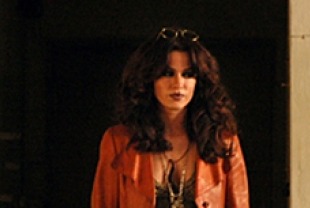Uschi Obermaier (Natalia Avelon) is a rebellious teenager who can't stand the rigid rules of her small German village. Her mother is horrified when she finds pictures of her daughter in erotic poses and calls her a "slut," so Uschi runs away from home. She yearns for the freedom to do what she likes and be who she wants to be. She joins the notorious and much publicized Kommune 1 in Berlin and immediately falls in love with its leader, Rainer Langhans (Matthias Schweighofer). He practices free love and tutors her in the requirements of non-possessive relationships, but she does not appreciate being shut out of his life. She's not really interested in the radical group's political efforts to change the world, and they disapprove of her stint as a successful fashion model.
Uschi moves on to romantic entanglements with Mick Jagger (Victor Noren) and Keith Richards (Alexander Scheer) of the Rolling Stones. Despite the pleasure of her close relationships with these rock superstars, she grows bored with the isolation that fame has brought them. It reminds her of the prison of her home as a teenager, even if this prison consists of plush hotel rooms and cars surrounded by fans.
Although the famous Italian producer Carlo Ponti offers her a ten-movie contract, Uschi latches on to adventurer Dieter Bockhorn (David Scheller), a bar owner in Hamburg's red light district who is known for his travels around the world. He falls in love with her, and they begin a two-year journey in his luxury bus that takes them around Asia and America. In India, Bockhorn is awed by a statue of Kali which looks exactly like Uschi whom he affectionately calls his "witch." They are married in an elaborate ceremony in India before journeying to Mexico.
This ambitious German biodrama directed by Achim Bornhak probes the life an icon of rebellion and sexual freedom in Germany during the 1960s. The German actress Natalia Avelon who plays Uschi certainly has the pouty beauty of Bridget Bardot and the physical allure that sends men into a swoon. She does succeed in conveying the restlessness that propels this small town woman on a frenzied quest for freedom that involves many lovers in far-flung places.
Eight Miles High is a cautionary tale about the acute discontent and loneliness that comes with the yearning for new, different, and exotic experiences. It was epidemic in the 1960s, but for many it led to a state of boredom with the present moment and a focus on the future. At one point in the drama, Uschi laments that she has spent a lot of time and energy being "an egotistical monster." Feeding that monster doesn't lead to freedom; it just puts her in many different kinds of prisons.
